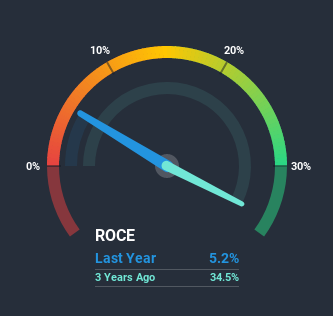Here's What's Concerning About Marshall Machines' (NSE:MARSHALL) Returns On Capital
What trends should we look for it we want to identify stocks that can multiply in value over the long term? Typically, we'll want to notice a trend of growing return on capital employed (ROCE) and alongside that, an expanding base of capital employed. This shows us that it's a compounding machine, able to continually reinvest its earnings back into the business and generate higher returns. However, after investigating Marshall Machines (NSE:MARSHALL), we don't think it's current trends fit the mold of a multi-bagger.
Return On Capital Employed (ROCE): What is it?
For those who don't know, ROCE is a measure of a company's yearly pre-tax profit (its return), relative to the capital employed in the business. To calculate this metric for Marshall Machines, this is the formula:
Return on Capital Employed = Earnings Before Interest and Tax (EBIT) ÷ (Total Assets - Current Liabilities)
0.052 = ₹32m ÷ (₹1.2b - ₹580m) (Based on the trailing twelve months to September 2020).
Thus, Marshall Machines has an ROCE of 5.2%. Ultimately, that's a low return and it under-performs the Machinery industry average of 11%.
Check out our latest analysis for Marshall Machines

Historical performance is a great place to start when researching a stock so above you can see the gauge for Marshall Machines' ROCE against it's prior returns. If you want to delve into the historical earnings, revenue and cash flow of Marshall Machines, check out these free graphs here.
What The Trend Of ROCE Can Tell Us
In terms of Marshall Machines' historical ROCE movements, the trend isn't fantastic. Over the last five years, returns on capital have decreased to 5.2% from 24% five years ago. Given the business is employing more capital while revenue has slipped, this is a bit concerning. This could mean that the business is losing its competitive advantage or market share, because while more money is being put into ventures, it's actually producing a lower return - "less bang for their buck" per se.
On a related note, Marshall Machines has decreased its current liabilities to 49% of total assets. That could partly explain why the ROCE has dropped. What's more, this can reduce some aspects of risk to the business because now the company's suppliers or short-term creditors are funding less of its operations. Since the business is basically funding more of its operations with it's own money, you could argue this has made the business less efficient at generating ROCE. Keep in mind 49% is still pretty high, so those risks are still somewhat prevalent.
In Conclusion...
In summary, we're somewhat concerned by Marshall Machines' diminishing returns on increasing amounts of capital. But investors must be expecting an improvement of sorts because over the last yearthe stock has delivered a respectable 42% return. In any case, the current underlying trends don't bode well for long term performance so unless they reverse, we'd start looking elsewhere.
One final note, you should learn about the 3 warning signs we've spotted with Marshall Machines (including 2 which are significant) .
For those who like to invest in solid companies, check out this free list of companies with solid balance sheets and high returns on equity.
If you decide to trade Marshall Machines, use the lowest-cost* platform that is rated #1 Overall by Barron’s, Interactive Brokers. Trade stocks, options, futures, forex, bonds and funds on 135 markets, all from a single integrated account. Promoted
New: Manage All Your Stock Portfolios in One Place
We've created the ultimate portfolio companion for stock investors, and it's free.
• Connect an unlimited number of Portfolios and see your total in one currency
• Be alerted to new Warning Signs or Risks via email or mobile
• Track the Fair Value of your stocks
This article by Simply Wall St is general in nature. It does not constitute a recommendation to buy or sell any stock, and does not take account of your objectives, or your financial situation. We aim to bring you long-term focused analysis driven by fundamental data. Note that our analysis may not factor in the latest price-sensitive company announcements or qualitative material. Simply Wall St has no position in any stocks mentioned.
*Interactive Brokers Rated Lowest Cost Broker by StockBrokers.com Annual Online Review 2020
Have feedback on this article? Concerned about the content? Get in touch with us directly. Alternatively, email editorial-team (at) simplywallst.com.
About NSEI:MARSHALL
Marshall Machines
Designs, develops, manufactures, and markets machine tool equipment in India.
Moderate risk and slightly overvalued.
Similar Companies
Market Insights
Community Narratives


Recently Updated Narratives

Bisalloy Steel Group will shine with a projected profit margin increase of 12.8%

Astor Enerji will surge with a fair value of $140.43 in the next 3 years

Proximus: The State-Backed Backup Plan with 7% Gross Yield and 15% Currency Upside.
Popular Narratives


MicroVision will explode future revenue by 380.37% with a vision towards success


NVDA: Expanding AI Demand Will Drive Major Data Center Investments Through 2026



